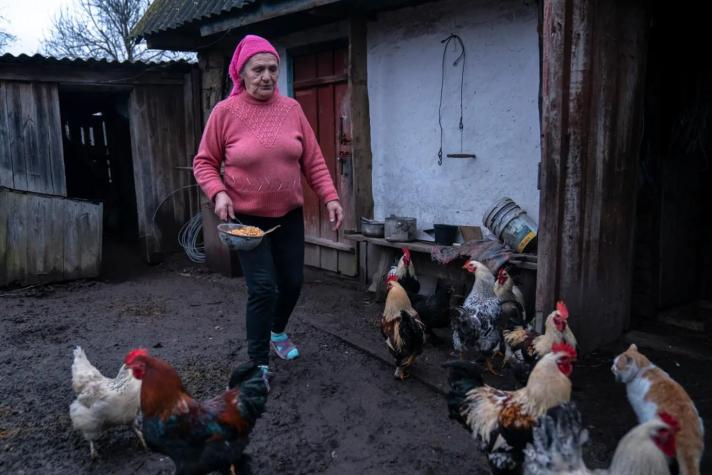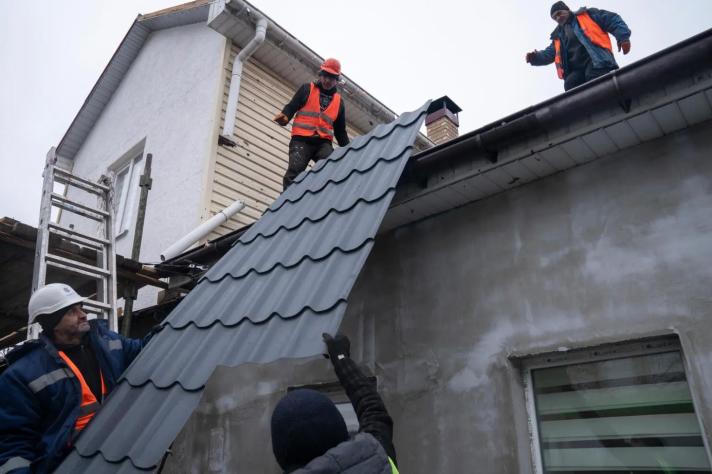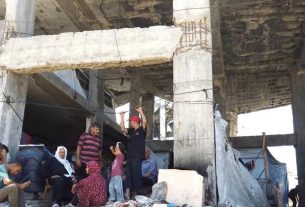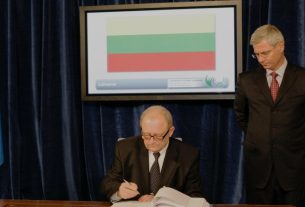Faced with huge destruction to civilian infrastructure, the UN’s Refugee Agency (UNHCR), with EU humanitarian aid support, carries out repairs to family homes in Ukraine where the impact goes far beyond bricks and mortar.
For the past 30 years, Liudmyla Bantsyr has grown vegetables on a large plot of land beside her house in Ozershchyna, a rural village an hour west of Kyiv.
Now aged 70, she still harvests hundreds of kilograms of potatoes each year by hand, storing them for the months ahead in an underground root cellar in her yard.
Following Russia’s full-scale invasion of Ukraine, Liudmyla endured weeks of terror in the cellar while the hostilities raged overhead.

“When the shooting started, I ran to the cellar. There were shells from this side, and from that side. You couldn’t get out. I spent a month in that cellar,” Liudmyla said.
© UNHCR, 2023
At night, she only had a candle for light. She would wrap herself in blankets and sleep on wooden planks laid over the mound of potatoes. Liudmyla stayed close to the entrance to avoid any danger of being being buried in an explosion.
“I was very afraid. It was cold, but I had to endure it,” she said.

During lulls in the fighting, she would briefly emerge to feed her dog and flock of chickens before heading back underground.
© UNHCR, 2023
When the fighting in the area ended, she was able to assess the damage to her home. The property’s fence and a shed had been destroyed, several windows blown out, and the roof peppered by shrapnel.
“The roof was riddled with holes, like a sieve,” Liudmyla said. “When it snowed and then melted, it all flowed into the house. I tried to patch it, but the house was exposed to the elements.”
Essential repairs
In late summer 2022, help arrived in the shape of an assessment team from the UN Refugee Agency (UNHCR) and its local NGO partner, Rokada, which approved repairs to her roof and fence that were carried out by local contractors.
Supported by EU humanitarian funding, UNHCR has engaged construction teams in several regions across Ukraine to carry out essential repairs to homes damaged during the war.
These light and medium repairs include replacing windows and doors and repairing damaged roofs and walls.
These repairs ensure that families can remain warm and secure in their own homes and communities rather than being forced to find alternative accommodation elsewhere. To date, over 5 million people have been forced to flee within Ukraine to escape the hostilities.

‘They are thankful that we came to do it. When we arrive, they offer us tea … and ask if we need any help,’ says builder Rafael.
© UNHCR, 2023
Rafael and his team know firsthand what it means to be pushed out of their home. They are originally from the eastern Donetsk oblast but were forced to flee with their families last year when the full-scale war broke out.
While the fighting continues back home, Rafael and his colleagues remain focused on the urgent task at hand.
“It is not about how we are feeling, but about seeing the eyes of the people who are happy that their houses are being repaired,” he explained. “It is important not to stop working also because of the snow and rain. We have to keep repairing houses for people.”
Liudmyla recently celebrated her 70th birthday by hosting a small gathering at home for friends in the village.
“I like to treat my guests well,” she said, and was happy to host them in a house that is once again warm and secure. The joyful celebrations also demonstrated how the repairs had a positive impact that went beyond just fixing the roof and walls.
“Our village is very friendly. If you approach someone and ask for help, they never refuse. The most important thing is that our community is united.”



